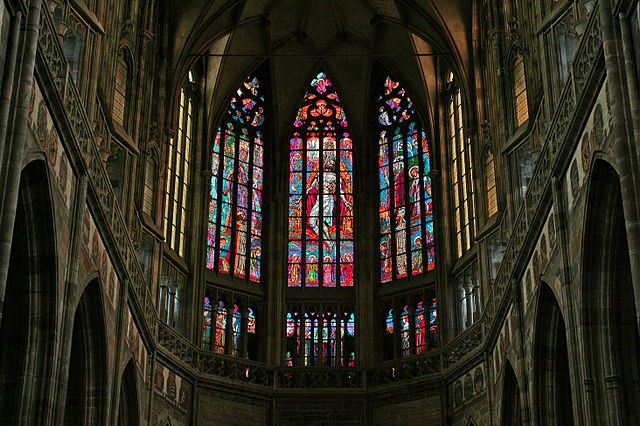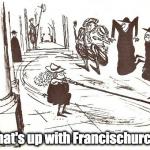
David Jones recommended the following article:
In regards to this whole conversation of the use of the term “Catholic Christians,” I refer you to Douglas Bushman’s article entitled “The Catholic on the Church – To Be Catholic is to be Christian, Period.” [link]
Here is my reply:
I agree with virtually all of the Bushman article. But any conclusion drawn from it that Catholic Christian is impermissible terminology is illogical and unfounded, in my opinion.
If the objection is, as he argues, that Catholicism is seen as something “added to” being a Christian, I reply by saying that this is not how I have ever regarded it (i.e., since my conversion). To me it is the fullness of Christianity, while Protestantism is a truncated, abbreviated, skeletal, least-common-denominator type of Christianity.
Christianity rightly understood in all its fullness, colors and multi-faceted nature is Catholicism, of course. How it somehow follows that saying Catholic Christian is an implicit acceptance of [C.S.] Lewisian “mere Christianity” (which I have been relentlessly critical of for fifteen years, though Lewis remains my favorite author) I know not. Perhaps Bushman himself isn’t even arguing this, and his opinions are wrongly being used to draw this erroneous conclusion.
There are all sorts of words which are misunderstood. But it doesn’t follow that we therefore cease using them. We need to carefully define and explain our terms.
I no more need to refrain from saying Catholic Christian than I have to refrain from saying Socratic philosophy or Thomist philosophy on the grounds that no other type of philosophy can pass muster with those, so we need to simply say Socratic method or Thomism as identical with philosophy, with all the other philosophies being mere pretenders. It simply doesn’t follow.
Bushman is obviously reacting to certain liberal outlooks which retire from an enthusiastic, confident presentation of the Catholic faith as the fullness of faith. Alas, it’s not a problem I have ever had. :-) I get accused of being a “triumphalist” all the time, and my insistence on the Newmanian requirement of accepting the entire faith or bust does not exactly endear me to Protestant dialogue opponents either. So he is preaching to the choir on this. But I don’t see why I would have to stop saying Catholic Christian in order to speak about these other things.
Certainly it is tomfoolery to suggest (as the inimitable John Lowell did) that to merely use the term suggests a terribly deficient ecclesiology. As just described, I don’t have that! So at least in my case, there is no truth to the charge at all.
Most of the article is not about this terminology. Since he allows for the latitude of speaking of other Christians, the contention that Catholic Christian either must mean or even imply some non-Catholic ecclesiology, collapses.
In fact, he is not even internally consistent if in fact he were to take a strict position himself that the phrase must mean what Mr. Lowell claims it intrinsically means, by his use of the term non-Catholic Christians. It’s real simple: if there are non-Catholic Christians, then there must be Catholic Christians, on the basis of the comparison and contrast, and the English language. Non-Catholic Christians are those who are Christians without being Catholics. They are a type of Christian distinguished by not being Catholic.
Therefore, the group they are being linguistically contrasted with must be Catholic Christians. There are more than one type of Christian, so it follows inexorably through the function of language and logic that Catholic Christian must be permissible as simply an instance of indicating a smaller sub-group of the larger sociological/religious group, which the author freely concedes (and indeed must, if he is to follow the teaching of Vatican II).
That being the case, this contention collapses in a heap. The only way it can succeed is to assert something which the author didn’t do: that Catholics are the only Christians, period. In that case, one could only describe Protestants as non-Catholics, since Catholic and Christian are absolutely identical. It would be nonsensical to describe them in that hypothetical situation as non-Catholic Christians. So this view must be discarded as internally incoherent and illogical.
At best one can only say that the phrase Catholic Christian may be misunderstood. But since that is true of almost any word these days, especially in the vexed world of religious controversies, it really isn’t saying much at all.
And note that this is coming from a person who fights “wars” about terminology all the time, and indeed, thinks it is important to do so. I refuse to use Reformation without quotes because I reject the description. I reject it because it was not what that word implies at all. Rather, it was a revolution or revolt. So I use those terms. I reject Enlightenment on similar grounds, because it presupposes that the spiritual and intellectual and cultural heritage of the highly Christian Middle Ages was a “darkness” from which “progressive” 18th-century man joyfully escaped.
I just don’t see any problem here, though. Christianity is a rather large group. There are different kinds of Christians. Catholicism is one of these. One then (hopefully) proceeds to defend and proclaim it as quintessential Christianity and the best kind. But classifying it as part of the larger group of Christianity does not undermine that endeavor in the least.
* * *
John Lowell wrote:
I’m terribly sorry, but the simile you offer us is in no way apt, Chris. In your illustration, Roman is an adjective and Catholic is a noun, much like Melkite Catholic might be. The unmistakable meaning of Catholic, used as it is in Hahnspeak, “Catholic Christian”, misrepresents our teaching. “Catholic” is improperly used as an adjective in this case.
This is thoroughly wrongheaded once again. I deny that there is a “grammatical” argument in the sense in which John intends this, at all. He implies that it is intrinsically indicative of an inferior brand of Christianity or Catholicism, if one simply uses Catholic Christian in the sense that Catholic functions grammatically as an adjective.
This doesn’t fly because John is apparently overlooking crucial category distinctions and different possibilities of relationships between ideas (thus, it is again, at bottom, I think, a logical or thinking problem here).
In our present case, Christianity is an umbrella term. As such, it necessarily contains less information than sub-groups contained “under” it (as strictly a matter of classification). It does not follow that describing a form of x Christianity makes x less than Christianity as if Christianity were the qualitatively greater concept of the two.
This follows, not only logically and grammatically, but also theologically, since, in fact, the Catholic Church recognizes other forms of Christianity beside itself, though it regards them as less full manifestations of same.
After all, Orthodoxy arose in the 11th century. Unless someone asserts that it is a less than Christian faith, then one must be able to distinguish Orthodoxy from Catholicism, as two different forms of Christianity. Thus: Catholic Christianity and Orthodox Christianity.
In other words, from a Catholic perspective, there is a form of Christianity beside itself, but not as full and complete as itself. Catholicism remains the fullest expression of Christianity (thus greater than [mere] Christianity) and so Catholic is the greater concept than Christianity, while it still remains perfectly permissible and proper to say Catholic Christianity.
In fact, it should also be noted that even C. S. Lewis’s own notion of “mere Christianity” presupposed this. His analogy to the house held that “mere Christianity” was the common hall in the house that all shared. Yet the fullest expressions of anyone’s particular Christianity remained in individual rooms.
Thus, you have “rooms of the house” yet the rooms are in a real sense greater than the house. They are the sub-category in one sense, but the greater notion of the two in another. The rooms are greater than the hall where all Christians met in the context of common beliefs. The hall is generic Christianity, but the rooms are fuller expressions of particular Christian belief-systems.
If that is insufficient to reveal the fallacies and category mistakes entertained by John in his analysis, then we may suggest various analogies.
For example, there is the umbrella category of “music,” which is, of course, almost unimaginably huge. Yet it contains less “content” than the categories underneath it. Classical music or gospel music immediately brings forth in one’s mind rich images and sounds. Is classical music somehow inferior to music because it is more specific and merely because in the phrase classical is an adjective describing a particular kind of music? Of course not.
We could take that analogy a step further, making a reductio ad absurdum:
Mozartian classical music is a deficient form of music because, after all, the Mozartian aspect is inferior to the classical category, since it is an adjective describing the latter, and classical is inferior to music because it describes that.
Is the fallacy here evident and obvious yet? I should think so!
There are also, of course, qualitative distinctions in the “adjectival” categories. If we were to compare Mozart’s classical music to Armstrong’s classical music (I toyed with some written and electronic “compositions” right after high school, as I had majored in music), it would be obvious immediately which thing was the vastly superior of the two.
How about filmmaking? There is that large umbrella category, which would encompass anything, even up to crude home movies or even pornography (if we are referring strictly to the process of making movies which can be played back).
So if we say Hitchcockian filmmaking or Kubrickian filmmaking are Stanley Kubrick or Alfred Hitchcock somehow “inferior” to the concept of “filmmaking”? Again, no. It doesn’t even make sense to say that. Rather, they are two directors who produced excellent manifestations of film, and examples of that art. The Kubrick film is an infinitely fuller expression of film than home movies of our kids made in the Armstrong household (no matter how cute and endearing we think they are).
How about art? You have sculpture as a larger category. Then you have Rodin’s sculpture and Michelangelo’s sculpture. Are we to say that no other sculpture exists because Michelangelo made his glorious David and Pieta? No, of course not. Does it degrade Michelangelo or imply that someone else was a greater sculptor to simply say that his work was a species of sculpture? Again, no, of course not.
Likewise, the fact that Catholic describes a type of Christianity and is an adjective in the phrase Catholic Christian has no bearing whatsoever on the supposed proposition which allegedly follows from this, that it makes Catholicism subservient to Christianity and somehow compromises the fullness of Catholic ecclesiology.
The only possible compromise in ecclesiology in this scenario is the tacit assumption in Lowell’s “argument” that there are no other forms of Christianity rightly so-called besides Catholicism. That clearly clashes with Vatican II ecclesiology, therefore is a deficient ecclesiology.
He wants to argue that he doesn’t assume this presupposition? I hope he does so, but then his whole contention about “Catholic Christian” will collapse. As far as I am concerned, it already has, based on logic, grammar, and Catholic magisterial teaching. No one has to use this terminology (just like no one has to pray the Rosary or believe in Fatima and Lourdes), but it is not in the slightest un-Catholic or sub-Catholic or theologically questionable to do so.
***
(originally 3-23-06)
Photo credit: Beautiful stained glass from the interior of St. Vitus Cathedral, Prague, Czech Republic. Taken on the 7-5-04 [Wikimedia Commons / Creative Commons Attribution-Share Alike 3.0 Unported license]
***












